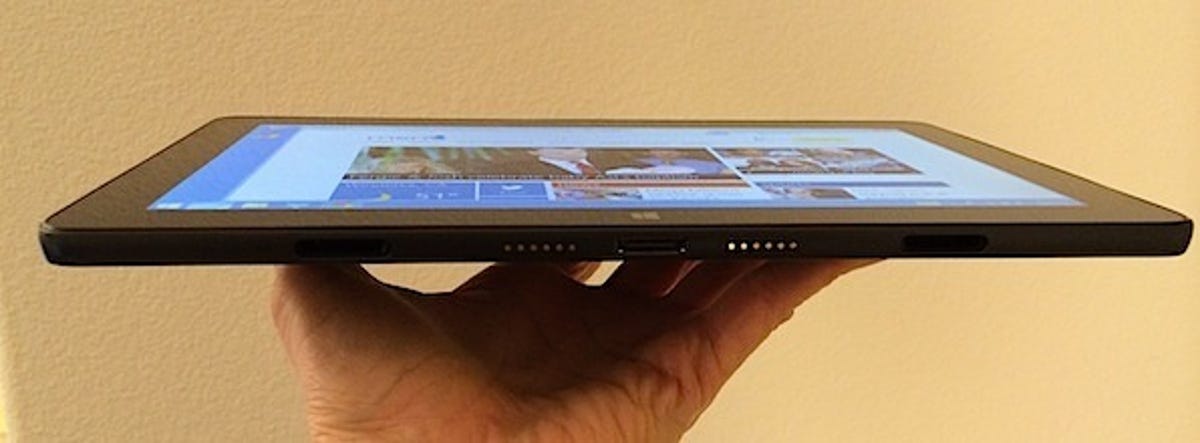My first impression of the Dell Venue 11 Pro is positive. It’s very different from the iPad Air but that’s OK.
The Venue 11 has a gorgeous 10.8-inch — an unusual size — 1,920×1,080 IPS display, and the model I’m using is powered by a quad-core Intel Atom Z3770 “Bay Trail” processor with 2GB of memory.
(See updated impressions of the Venue 11 Pro.)
And Dell bundles Microsoft Office Home and Student 2013 with the $500 tablet (64GB version).
I’ve been using it for about a week and the 64-bit Bay Trail processor feels fast running the 32-bit version of Windows 8.1. (Note that 64-bit Windows 8 for Atom won’t arrive until the first quarter of 2014.)
I haven’t seen any lag in anything I’ve done. But I should qualify that by saying it’s been limited, so far, to lots of Web browsing and video.
Speed (Bay Trail model): The Venue 11 posted Geekbench scores that were lower than the iPad Air on single-core performance but higher than the Air on multicore. (See the notes attached to the YouTube video below to see the exact scores).
I won’t dive into productivity — which would involve more traditional Windows desktop performance metrics — with Microsoft Office until the Dell Tablet Keyboard arrives. I was expecting to post my first impressions after using the keyboard, but shipment has been delayed (and I got tired of waiting).
Related story
Tablet or laptop? Which brings me to the un-iPad aspect of the Venue 11. It’s bigger, thicker, and heavier than the iPad Air (which I also use). But that’s not surprising, because it’s really been designed as a hybrid tablet-laptop, aka a 2-in-1, not a standalone tablet.
In fact, the model I’m using is the only model with Intel’s Bay Trail processor. The other two models use Intel’s higher-performance “Haswell” Core i3 and Core i5 power-efficient Y series processors.
Those Haswell processors put it into laptop performance territory, so expect performance that’s better than the scores posted by the Bay Trail model.
Surface Pro 2 or Venue 11 Pro? In this respect, the Venue 11 is not unlike the Surface Pro 2 — which also squeezes a Haswell processor into a tablet design. And that appears to be Dell’s target market: businesspeople who need a tablet that can also serve as a lightweight laptop.
Note that it’s thinner and lighter than the 10.6-inch Surface Pro 2. The Venue 11 Bay Trail model is 0.4-inches thick and 1.68 pounds compared with the Surface Pro 2, which is 0.53 inches thick and 2 pounds. (The Venue 11 Haswell model is 0.48 inches thick and 1.75 pounds).
(See video of the thickness here.)
And the similarity doesn’t end with the processor. Dell offers two keyboards for the Venue 11. One is the
“Dell Tablet Keyboard — Mobile,” which integrates a battery, extending battery life. The other is the Surface-like
“Dell Tablet Keyboard — Slim,” which is a cover and a keyboard.
Battery life: Battery life has been good. Using it on and off during the day (let’s say roughly a couple of hours every day), the charge lasted for more than four days — and that’s without manually shutting it down, just leaving it “on” in standby mode.
Wrap-up: As a first impression (this is not a full review — CNET will be posting one later), it has promise as a decent hybrid and has the potential to replace my 4-year-old Dell Adamo laptop.
And that’s the reason I’m trying out the Venue 11. Microsoft and Intel are pushing detachables (in which the keyboard can be detached, yielding a standalone tablet) big time as an answer to tablets like the iPad Air.
The thinking is, you won’t need both an iPad Air and a MacBook if you have one device like the Venue 11 Pro.
But I’m going to need a lot of convincing, because on most days, I do switch between iPads and a MacBook, and so far I haven’t found a better alternative. (The Adamo is used less often because of its age).
I tried the original Surface Pro for two months then sold it. It just didn’t cut it as tablet; it was a decent — but not a great — laptop.
I will update this post next week when the Dell keyboard is finally expected to arrive. At that time I will also put down my iPads and MacBook and see if Dell’s (and Microsoft’s and Intel’s) 2-in-1 vision is practical.


Brooke Crothers
The Dell Venue 11 Pro posted scores of 970 and and 3,079 on the single-core and multi-core Geekbench 3 benchmarks, respectively. The single core was considerably less than the iPad Air single-core (1,477) but better than the Air’s multi-core (2,681).



